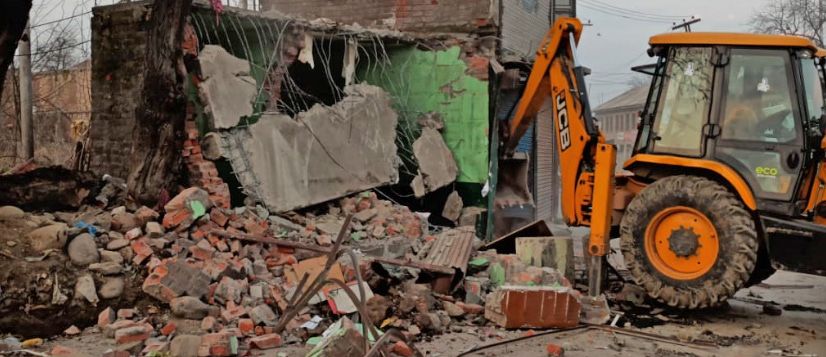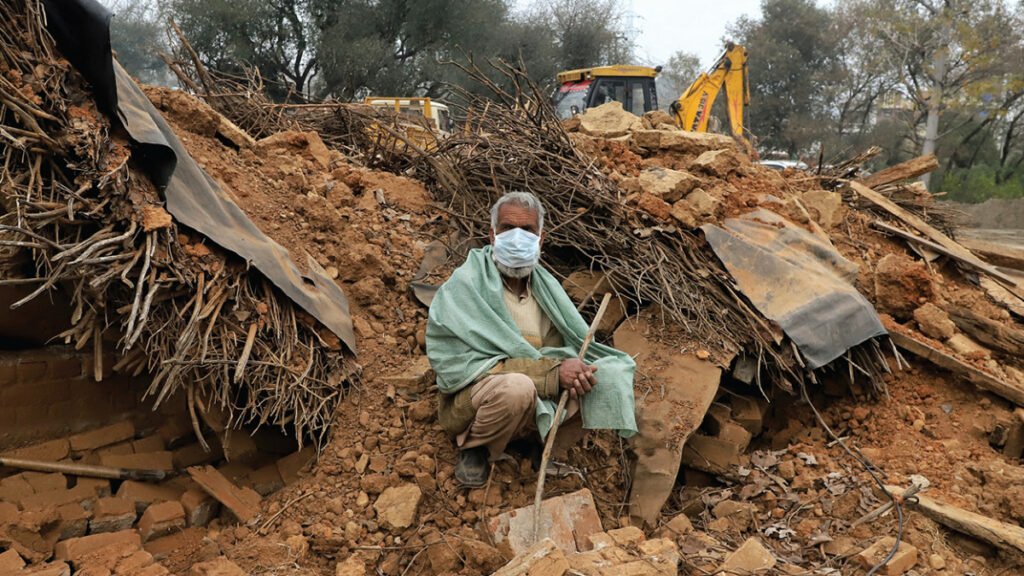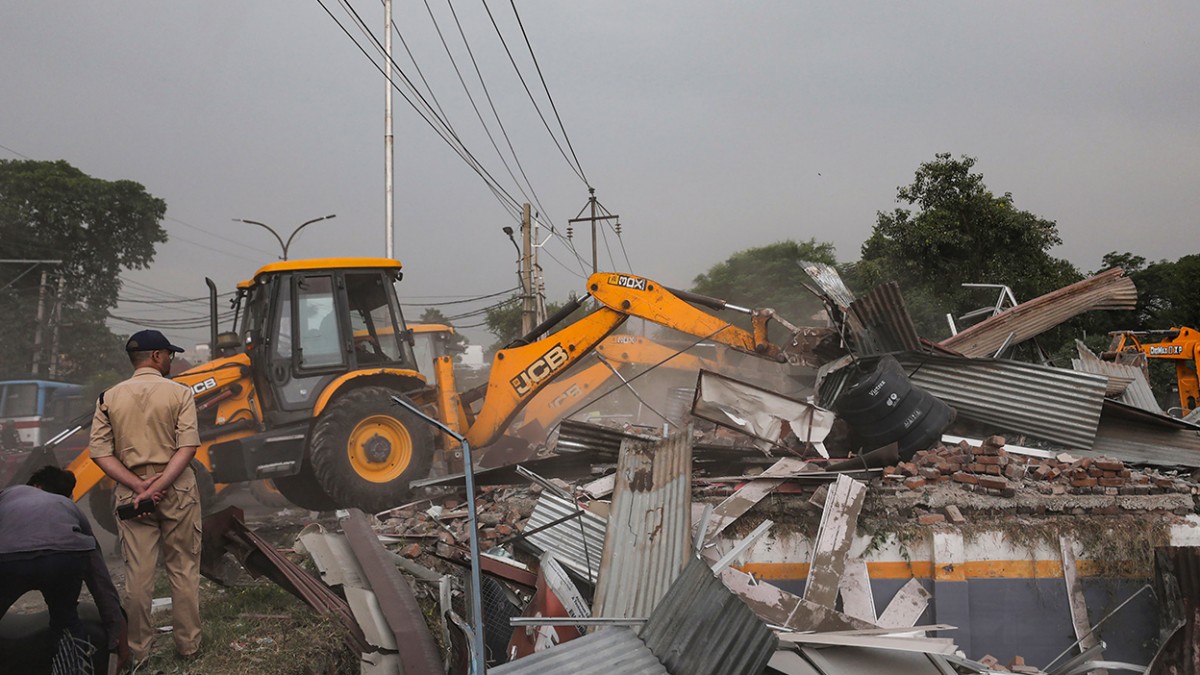In order to reclaim state-owned property that according to the official narrative, powerful actors had been encroaching on, the administration of Jammu and Kashmir began an eviction drive in January. With the publication of a government circular on January 9, 2023, instructing the tax officers to reclaim the state land that had been encroached upon, the eviction drive got underway. The majority of the land that the administration is reclaiming was given to people in Jammu and Kashmir in accordance with the Roshni Act or (Vesting of Ownership to the Occupants) Act 2001.
The Jammu and Kashmir Assembly approved the Roshni Act in 2001, granting residents occupation rights in order to collect money for electricity projects. The money subsequently made was to be used to improve Jammu and Kashmir’s electricity production and this is how it got its name, Roshni. As of the time this feature was being put up, the UT government had recovered more than 20 lakh kanals, or more than 2.5 lakh hectares, of state, shamilat land, and ghacharai land as per a report.
The Big Landed Estates Abolition Act of 1950 was a crucial piece of regulation that recognised the value of land ownership as a tool for advancing social and economic equality. So, it is not the question of whether the demolition drive was legally right or wrong; rather, a crisis was caused by the government’s poor planning and communication. Many individuals are now homeless and without jobs due to the government’s actions, and their suffering has been worsened by the exposure to inclement weather.
There may not seem to be an issue at first glance because it appears like encroached land is being reclaimed, but there are more intense issues going on under the rug. People whose properties are being demolished said that they didn’t receive any prior notices from the authorities. A lot of them claim to have papers showing their ownership of the properties, but the government destroyed their homes without giving them a chance to make their case as per media reports. Unsettling photographs and videos are pouring from the valley, where people plead with authorities to spare them.

“The demolition of my house as well as the shopping complex has left me agonised. We did not receive any notice from the administration, and within hours, all our structures were razed. This is the worst situation we have ever faced,” 35-year-old Jahangeer Ahmad Bhat of Khar Mode, Awantipora, tells The Wire. “Under the International Covenant on Economic, Social, and Cultural Rights, to which India is a party, everyone has the right to adequate housing which includes a prohibition on forced evictions. Where justified, evictions should be carried out in accordance with general principles of reasonableness and proportionality and include safeguards of reasonable and adequate notice; provision of legal remedies for infringement of rights; and provision of legal aid to people who need it to seek redress from the courts. No one should be made homeless or vulnerable to other human rights violations because of evictions,” OHCHR charter.
Protesters claim that not just the wealthy are being targeted, but also common people who run small businesses and merchants. The month-long anti-encroachment drive in J&K, however, was suspended in the events that followed as a result of strong criticism and the centre’s intervention. The centre directed the J&K government to send out notices and provide everyone a chance to be heard fairly. To comprehend the context in this case, our readers must have some background knowledge. Jammu and Kashmir were at the heart of the land reforms movement in India.
“The ongoing demolitions appear to be an extension of the brutal human rights violations the region of Jammu and Kashmir, the only Muslim majority region of India, has historically witnessed. These demolitions could amount to forced evictions which constitute a gross violation of human rights,” says Aakar Patel, chair of the board for Amnesty International India. The anti-encroachment campaign garnered harsh criticism from every part of the valley and widespread support from India’s and Jammu and Kashmir’s political elite.
Also read: A Case for Freedom: A Comparative Account Of Colonial Occupation In Palestine & Kashmir
Congress leader Rahul Gandhi on February 12 attacked the BJP over the ongoing anti-encroachment drive in Jammu and Kashmir, saying the Union Territory wanted employment, better business, and love but instead got the “BJP’s bulldozer“. The Jammu and Kashmir authorities claimed that these residences, commercial buildings, and shopping centres were built on illegally occupied land.

Locals contend that these buildings have belonged to them for many years, and the demolition campaigns are a result of the changes that have taken place in the Valley since Article 370 was repealed in August 2019 and Jammu and Kashmir lost their special status. Manoj Sinha, the Jammu and Kashmir Lieutenant Governor, issued a statement in view of the harsh criticism, “Bulldozers will only be used on the land of influential and powerful people during this drive and no poor or common man will be touched.” The reality on the ground, however, paints a different picture. Since the campaign began, protests have grown more violent in both Jammu and Kashmir.
Protesters claim that not just the wealthy are being targeted, but also common people who run small businesses and merchants. The month-long anti-encroachment drive in J&K, however, was suspended in the events that followed as a result of strong criticism and the centre’s intervention. The centre directed the J&K government to send out notices and provide everyone a chance to be heard fairly. To comprehend the context in this case, our readers must have some background knowledge. Jammu and Kashmir were at the heart of the land reforms movement in India. The Big Landed Estates Abolition Act of 1950 was an important turning point in Jammu and Kashmir’s history. It represented a stride in the direction of a society that was more inclusive, just, and egalitarian.
Also read: ‘The Kashmir Files’: India’s ‘Schindler’s List’ Or Right-Wing Extremist Propaganda?
Regardless of their social or economic status, the Act honoured the toil of those who worked the land and gave them ownership rights. Every family now has the chance to own land and take part in their community’s economy, even those from traditionally marginalised populations. The Big Landed Estates Abolition Act of 1950 and the Jammu and Kashmir State Land (Vesting of Ownership to Occupants) Act are somehow connected, the latter could be seen as a continuation of the land reforms initiated by the former. Both acts aimed to promote land redistribution and address issues of land ownership and tenure in Jammu and Kashmir. However, in the unfolding events, the Jammu and Kashmir High Court’s ruling deemed the Jammu and Kashmir State Lands (Vesting of Ownership to the Occupants) Act in October 2020, as null and void and land acquired under this act illegal.
This shift in ownership rights over state property in Jammu and Kashmir has impacted everyone who benefited, the worst being a disadvantageous lot. The recent demolishing drive has been forcibly removing people from their houses, inflicting great distress and anguish. The Act was important in ensuring that land was distributed more evenly among the population, and its reversal is having significant repercussions on the state’s development and progress. It is important to understand that laws and regulations go beyond written guidelines. They have a real-time effect on people and the community.
Also read: The Many Dangers Of Being A Woman Journalist In Kashmir
The Big Landed Estates Abolition Act of 1950 was a crucial piece of regulation that recognised the value of land ownership as a tool for advancing social and economic equality. So, it is not the question of whether the demolition drive was legally right or wrong; rather, a crisis was caused by the government’s poor planning and communication. Many individuals are now homeless and without jobs due to the government’s actions, and their suffering has been worsened by the exposure to inclement weather. Before beginning the demolition drive, the government had to offer suitable alternatives for accommodation and support, especially in light of the region’s severe winter weather. Furthermore, concerns have been expressed about the government’s respect for the rights and dignity of those who have been impacted by its actions.
About the author(s)
She is a Research Scholar, currently dedicated to pursuing her doctoral studies in the field of Political Science and International Relations. With more than ten years of hands-on experience across various media-related domains, she has established herself as a seasoned Media Professional.




